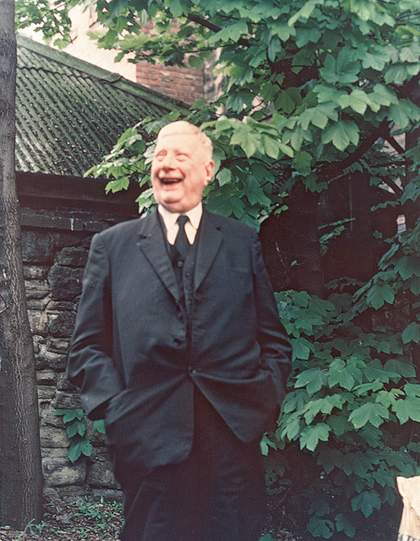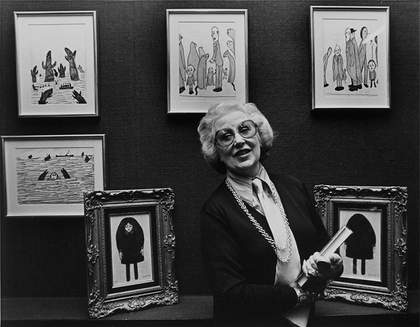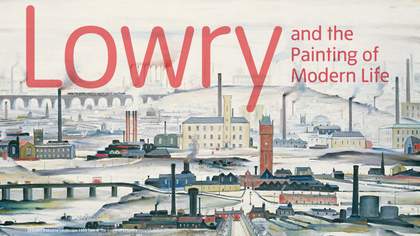My mother, Tilly, and I had first met L.S. Lowry at an exhibition in Harrogate in 1960. About four years later he came into the Stone Gallery in Newcastle. We were in the middle of hanging our first show in the premises when he just walked in off the street, and ended up staying all day. He just somehow appeared in the family like an elderly relation and became gradually absorbed into our life.
He began to visit the north east regularly, and would often stay for weeks at a time at the Seaburn Hotel in Sunderland. He would come into the gallery every morning for coffee with my father, Micky, and they would talk at length, then have lunch. In the afternoons I would take him out for a tatters (a drive), usually up the coast – anywhere within a two-hour trip from Newcastle. He loved going back and forth across the Tyne on the ferry between North and South Shields, and wherever we went – no matter how remote – he’d been there before. He had the most encyclopedic knowledge of the British Isles. Over the years I must have driven him thousands and thousands of miles; to Holy Island, Gretna Green and Portpatrick, where he believed his ancestors came from. I very rarely saw him sketch or work outside. Although he carried a wallet with bits of paper in and might draw something on an envelope as we walked around, he mostly liked to work at home. He was absorbing things as we went, and would then appear at some later stage with a drawing of a place we’d been to, done from memory.

L.S. Lowry in the garden at his house in Mottram-in-Longdendale
He loved repeating himself, and he’d push it to see how far he could go. We’d be driving along in the car and he’d say to me: ‘What happens if the wheel falls off?’ ‘We’ll go in the ditch, Mr Lowry.’ ‘Hmm.’ Ten minutes later: ‘What happens if the wheel falls off?’ and so on. It was just said to wind me up. My wife, Veral, would cook him dinner, we’d talk, and then I’d drive him back to the Seaburn. He had friends all over the country, though he used to keep them quite separate and compartmentalised. Any theory that he was a lonely man is an absolute nonsense. He was also extremely generous with his advice and support, and would buy the work of young artists to encourage them, no matter how good their paintings were.
He could be great fun, but he could be awful. He could be exceedingly amusing, but also an absolute little sod. He had some moods where he was not at all nice, but most of the time he was really very pleasant and jolly. He used to say to waitresses in restaurants: ‘Could I have this water diluted?’ I saw my mother, who was quite a fiery person, lose her temper with him on occasion, and then he backed down. But it was a strange relationship. He was just like an uncle. I think he was a very normal man, though he never mentioned the fact he’d had a whole working life in Manchester before he started painting and became the artist that the world knew and recognised.

Tilly Marshall at the launch of her book Life with Lowry, 1981
Lowry got my mother hooked on the Pre-Raphaelites, though my father was admittedly less keen. They started the Rossetti Society at the gallery, of which Lowry was unanimously voted president (this then became his nickname to all visitors). My father was chaplain and mother was librarian. The only rule of entry to the club was you had to own a Rossetti work you’d bought at the gallery, and enjoy discussing it over dinner. Lowry already had several, and his passion was soon inherited by the others. The last person he spoke to before he died was Veral. He rang up and said: ‘I’m coming over to Seaburn.’ The next we heard he’d fallen down the stairs. We went to visit him in hospital, but he was out cold. At seven o’clock the next morning we heard on the radio: ‘The painter L.S. Lowry has died.’
I have Lowry’s walking stick upstairs on the landing, so I shall bring that with me when I come to the show at Tate Britain.

